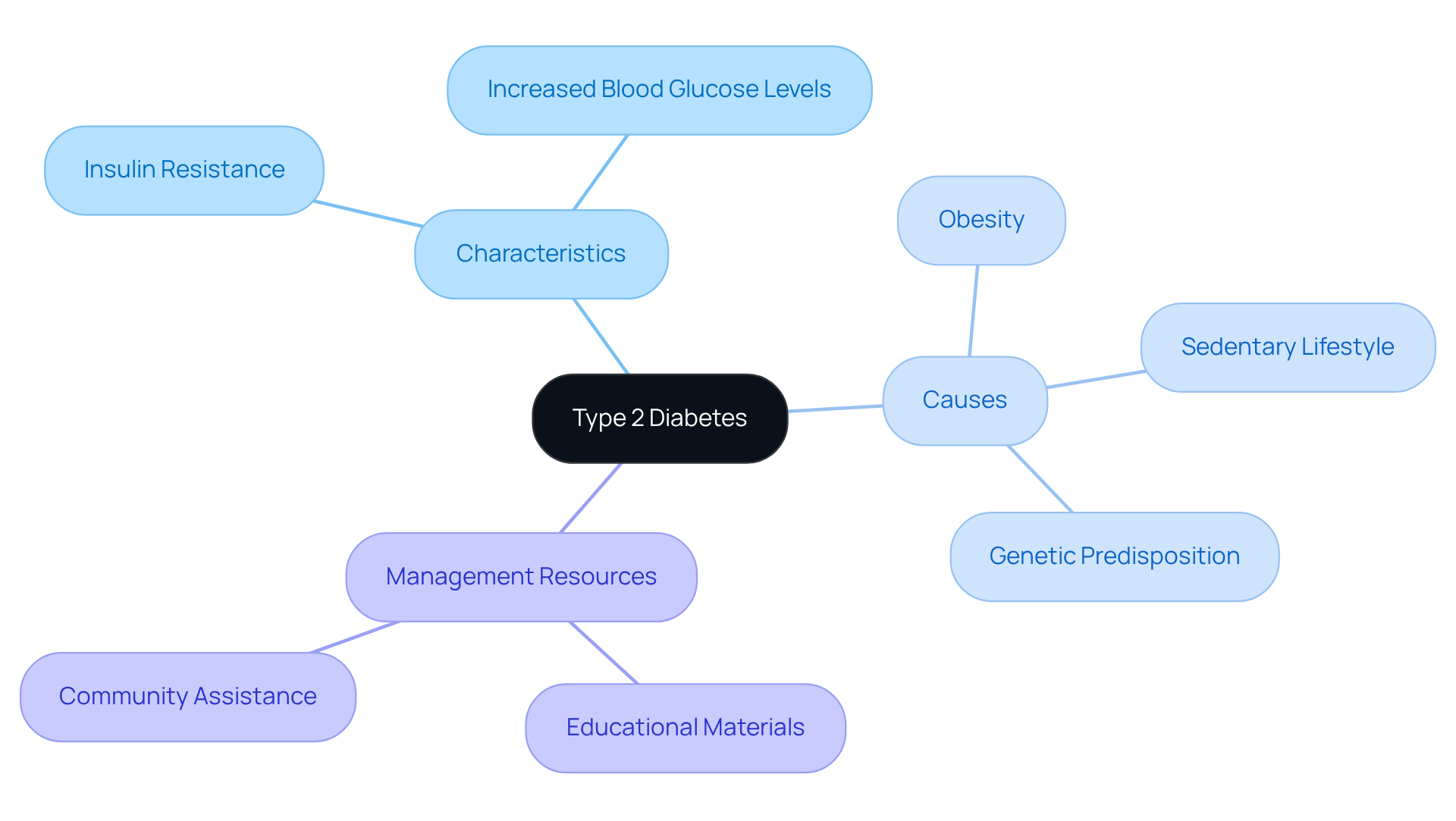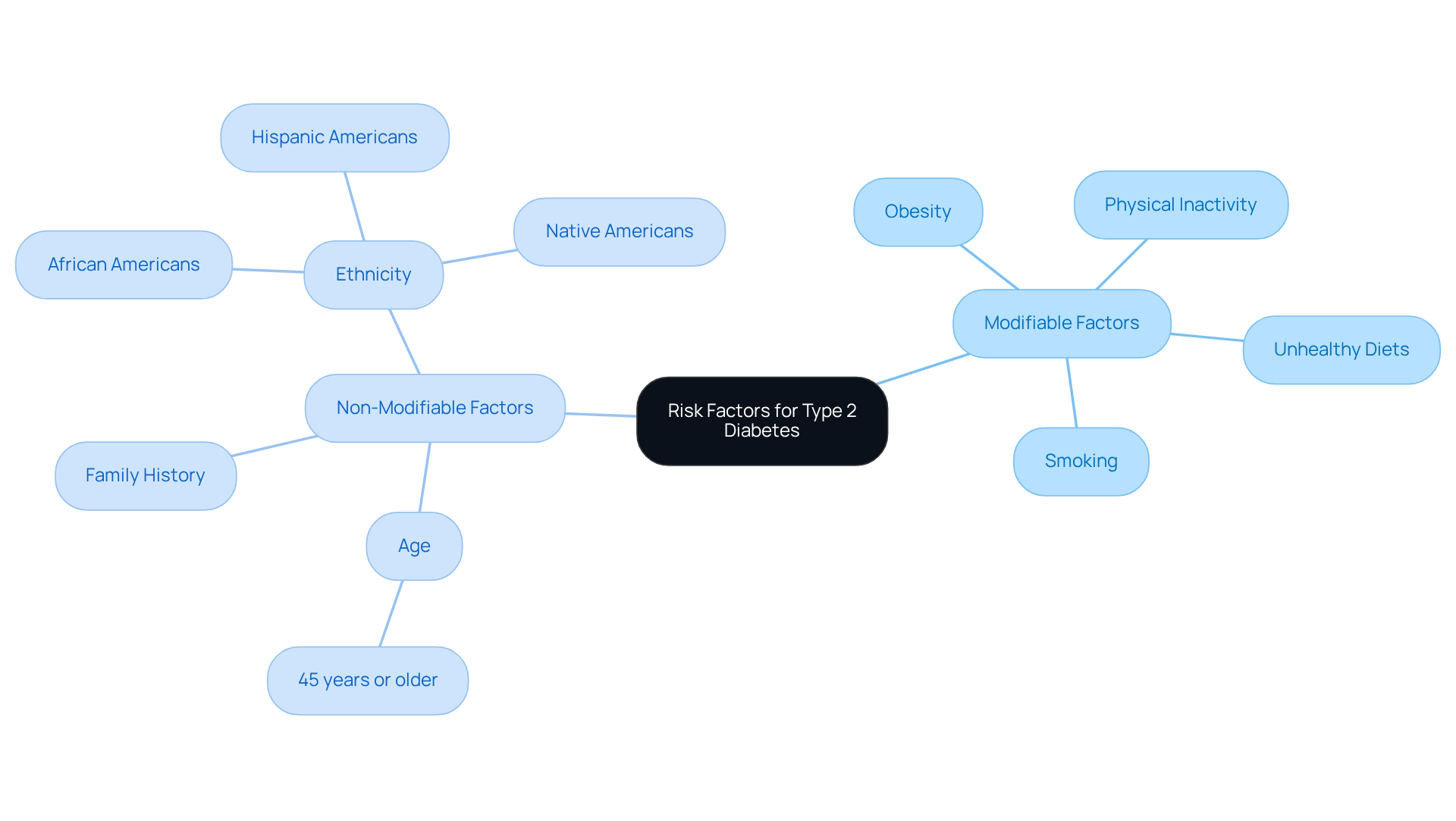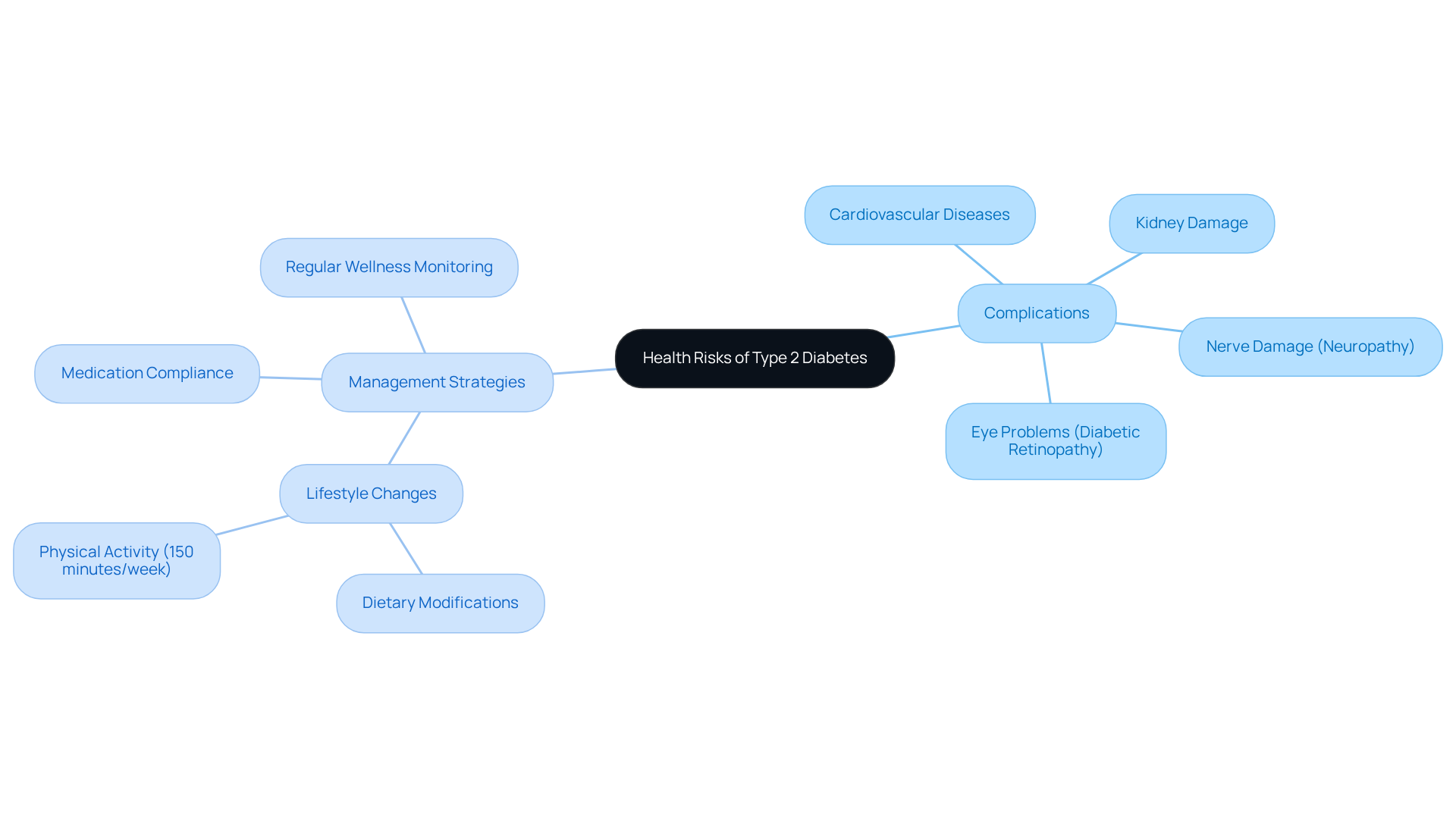Overview
Obesity, especially excess abdominal fat, is the leading cause of Type 2 diabetes. This condition significantly contributes to insulin resistance and elevated blood sugar levels. It’s important to acknowledge that around 90% of individuals diagnosed with Type 2 diabetes are overweight or obese. This statistic highlights the critical role that lifestyle factors, such as sedentary behavior and poor dietary choices, play in the development of this condition.
It's understandable to feel overwhelmed by this information. However, recognizing the impact of lifestyle choices can empower you to make positive changes. You’re not alone in this journey; many others are navigating similar challenges. Together, we can explore healthier habits that support your well-being.
Consider reaching out for support or resources that can guide you in making these changes. Remember, small steps can lead to significant improvements in your health. We are here to support you every step of the way.
Introduction
Type 2 diabetes has reached alarming levels globally, with over 90% of diabetes cases attributed to this chronic condition. It's understandable to feel concerned about this statistic. Central to its development is a complex interplay of factors, particularly obesity, which stands as the leading cause of insulin resistance. As awareness grows, many individuals find themselves grappling with the implications of lifestyle choices and genetic predispositions that contribute to this health crisis.
What proactive steps can we take to combat the rising tide of type 2 diabetes? Understanding its root causes can empower individuals to reclaim their health. We are here to support you every step of the way, as you navigate this journey toward better health. You're not alone in this, and together we can explore the steps needed to foster a healthier future.
Define Type 2 Diabetes: An Overview
Type 2 Diabetes is a chronic metabolic disorder that can feel overwhelming. It is characterized by insulin resistance and relative insulin deficiency. Unlike Type 1 Diabetes, where the body fails to produce insulin, individuals with Type 2 Diabetes can produce insulin, but their bodies do not use it effectively. This can lead to increased blood glucose levels, which may result in various medical complications if not managed properly.
It's understandable to feel concerned, especially since this condition is often linked to obesity, sedentary lifestyles, and genetic predisposition, which are the number one cause of type 2 diabetes. These factors contribute to its status as the number one cause of type 2 diabetes, making it a significant public health concern worldwide. According to the International Federation, more than 90% of all diabetes cases globally are Type 2, highlighting its commonality and the urgent need for effective management strategies.
At T2DSolutions, we want you to know that you're not alone on this journey. We offer extensive resources and community assistance to empower those who have recently been diagnosed. Through educational materials and lifestyle modification strategies, we address the critical need for effective management. Our goal is to support you every step of the way, helping you navigate this growing epidemic with confidence and care.

Identify the Leading Cause of Type 2 Diabetes
Obesity, especially excess abdominal fat, is considered the number one cause of type 2 diabetes, as it significantly contributes to insulin resistance, a condition where the body's cells struggle to respond to insulin. This can lead to elevated blood sugar levels, which is concerning. It's important to note that around 90% of individuals diagnosed with type 2 diabetes are overweight or obese. Many health professionals emphasize that abdominal fat is the number one cause of type 2 diabetes, as it plays a critical role in worsening insulin resistance and increasing the risk of developing diabetes-related conditions.
It's understandable to feel overwhelmed when considering the factors that contribute to this risk, such as:
- A sedentary lifestyle
- Poor dietary choices
- Genetic predisposition
However, there is hope. Lifestyle modifications—like engaging in regular physical activity and maintaining a balanced diet—have shown effectiveness in preventing type 2 diabetes. For instance, individuals who exercise regularly can reduce their risk of developing this condition by as much as 46%.
For those newly diagnosed, T2DSolutions serves as a valuable resource hub. They offer education and community support to help manage your condition. By promoting a comprehensive approach to managing blood sugar issues, T2DSolutions highlights the importance of mental well-being alongside lifestyle changes. Remember, you are not alone in this journey. Proactive health management is key to addressing the health crisis related to diabetes, and support is available every step of the way.
Examine Risk Factors for Type 2 Diabetes
Understanding the risk factors for Type 2 Diabetes is an important step in taking charge of your health. These factors can be divided into modifiable and non-modifiable categories.
- Obesity
- Physical inactivity
- Unhealthy diets
- Smoking
are all modifiable risk factors that contribute to the number one cause of type 2 diabetes. On the other hand, non-modifiable factors encompass:
- Age
- Family history
- Ethnicity
For example, individuals over the age of 45, those with a family history of diabetes, and certain ethnic groups—like African Americans, Hispanic Americans, and Native Americans—face a higher risk.
It's completely normal to feel overwhelmed when learning about these risk factors. Grasping this information is crucial for early intervention and prevention. By understanding your personal risk factors, you can take proactive steps toward managing your well-being. At T2DSolutions, we are here to support you every step of the way. Our goal is to provide resources and assistance to help newly diagnosed patients like you understand these risk factors and implement effective management strategies.
By utilizing our educational resources and community support, you can enhance your opportunities to prevent or postpone what is known as the number one cause of type 2 diabetes. Remember, you're not alone in this journey. We encourage you to reach out, share your experiences, and connect with others who understand what you're going through. Together, we can navigate this path toward better health.

Explore Health Risks and Complications of Type 2 Diabetes
Type 2 Diabetes can lead to serious medical complications if not managed effectively, and it's understandable to feel concerned about this. Key issues include:
- Cardiovascular diseases
- Kidney damage
- Nerve damage (neuropathy)
- Eye problems like diabetic retinopathy
In fact, this condition is a leading cause of blindness and kidney failure, as highlighted by the World Health Organization. Recent statistics reveal that roughly 50% of people with high blood sugar levels pass away due to cardiovascular conditions, such as heart disease and stroke. This underscores the essential connection between elevated blood sugar and vascular well-being.
Moreover, diabetes was the eighth leading cause of death in the United States in 2021, emphasizing the severity of the condition. But there is hope—efficient management approaches, including:
- Lifestyle changes
- Medication compliance
- Regular wellness monitoring
are crucial to reducing these risks. For instance, engaging in at least 150 minutes of moderate physical activity weekly can significantly lower the risk of complications.
Additionally, dietary modifications and weight control are essential in preventing the onset of diabetes-related complications. It's important to note that more than 60 percent of nontraumatic lower limb amputations occur in people with diabetes, highlighting the severe complications that can arise from unmanaged diabetes.
By adopting these strategies, you can enhance your overall health outcomes and reduce the likelihood of severe complications associated with unmanaged Type 2 Diabetes. Remember, you're not alone in this journey, and we are here to support you every step of the way.

Conclusion
Understanding the primary cause of Type 2 Diabetes is essential for managing this prevalent health issue. At its core, obesity, particularly excess abdominal fat, stands out as the leading contributor to insulin resistance, a hallmark of Type 2 Diabetes. This condition affects millions globally, and it is not just a personal health concern; it is a significant public health challenge that requires our attention and action.
This article highlights critical insights into the factors leading to Type 2 Diabetes, including lifestyle choices such as physical inactivity and poor diet, along with genetic predispositions. With over 90% of individuals diagnosed being overweight or obese, the importance of proactive lifestyle modifications cannot be overstated. Engaging in regular exercise and maintaining a balanced diet can dramatically reduce the risk of developing this condition. Change is possible and achievable, and you are not alone in this journey.
Ultimately, addressing the number one cause of Type 2 Diabetes is a collective effort that requires awareness, education, and support from resources like T2DSolutions. By understanding risk factors, embracing healthier lifestyles, and seeking community support, individuals can take significant strides toward preventing and managing this chronic condition. Remember, each step taken toward a healthier life not only benefits your personal well-being but also contributes to alleviating the broader diabetes epidemic. Together, we can make a difference.
Frequently Asked Questions
What is Type 2 Diabetes?
Type 2 Diabetes is a chronic metabolic disorder characterized by insulin resistance and relative insulin deficiency, leading to increased blood glucose levels.
How does Type 2 Diabetes differ from Type 1 Diabetes?
Unlike Type 1 Diabetes, where the body fails to produce insulin, individuals with Type 2 Diabetes can produce insulin but do not use it effectively.
What are the main causes of Type 2 Diabetes?
The main causes of Type 2 Diabetes include obesity, sedentary lifestyles, and genetic predisposition.
How common is Type 2 Diabetes globally?
According to the International Federation, more than 90% of all diabetes cases globally are Type 2, indicating its widespread prevalence.
Why is Type 2 Diabetes considered a public health concern?
Type 2 Diabetes is a significant public health concern due to its high prevalence and the various medical complications that can arise if it is not managed properly.
What resources are available for those diagnosed with Type 2 Diabetes?
T2DSolutions offers extensive resources and community assistance, including educational materials and lifestyle modification strategies, to support individuals diagnosed with Type 2 Diabetes.



